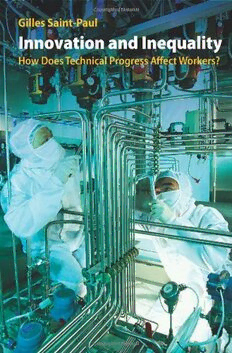Download Innovation and Inequality: How Does Technical Progress Affect Workers? PDF Free - Full Version
Download Innovation and Inequality: How Does Technical Progress Affect Workers? by Gilles Saint-Paul in PDF format completely FREE. No registration required, no payment needed. Get instant access to this valuable resource on PDFdrive.to!
About Innovation and Inequality: How Does Technical Progress Affect Workers?
Karl Marx predicted a world in which technical innovation would increasingly devalue and impoverish workers, but other economists thought the opposite, that it would lead to increased wages and living standards--and the economists were right. Yet in the last three decades, the market economy has been jeopardized by a worrying phenomenon: a rise in wage inequality that has left a substantial portion of the workforce worse off despite the continuing productivity growth enjoyed by the economy. Innovation and Inequality examines why. Studies have firmly established a link between this worrying trend and technical change, in particular the rise of new information technologies. In Innovation and Inequality, Gilles Saint-Paul provides a synthetic theoretical analysis of the most important mechanisms by which technical progress and innovation affect the distribution of income. He discusses the conditions under which skill-biased technical change may reduce the wages of the least skilled, and how improvements in information technology allow "superstars" to increase the scale of their activity at the expense of less talented workers. He shows how the structure of demand changes as the economy becomes wealthier, in ways that may potentially harm the poorest segments of the workforce and economy. An essential text for graduate students and an indispensable resource for researchers, Innovation and Inequality reveals how different categories of workers gain or lose from innovation, and how that gain or loss crucially depends on the nature of the innovation.
Detailed Information
| Author: | Gilles Saint-Paul |
|---|---|
| Publication Year: | 2008 |
| ISBN: | 9781400824779 |
| Pages: | 207 |
| Language: | English |
| File Size: | 0.825 |
| Format: | |
| Price: | FREE |
Safe & Secure Download - No registration required
Why Choose PDFdrive for Your Free Innovation and Inequality: How Does Technical Progress Affect Workers? Download?
- 100% Free: No hidden fees or subscriptions required for one book every day.
- No Registration: Immediate access is available without creating accounts for one book every day.
- Safe and Secure: Clean downloads without malware or viruses
- Multiple Formats: PDF, MOBI, Mpub,... optimized for all devices
- Educational Resource: Supporting knowledge sharing and learning
Frequently Asked Questions
Is it really free to download Innovation and Inequality: How Does Technical Progress Affect Workers? PDF?
Yes, on https://PDFdrive.to you can download Innovation and Inequality: How Does Technical Progress Affect Workers? by Gilles Saint-Paul completely free. We don't require any payment, subscription, or registration to access this PDF file. For 3 books every day.
How can I read Innovation and Inequality: How Does Technical Progress Affect Workers? on my mobile device?
After downloading Innovation and Inequality: How Does Technical Progress Affect Workers? PDF, you can open it with any PDF reader app on your phone or tablet. We recommend using Adobe Acrobat Reader, Apple Books, or Google Play Books for the best reading experience.
Is this the full version of Innovation and Inequality: How Does Technical Progress Affect Workers??
Yes, this is the complete PDF version of Innovation and Inequality: How Does Technical Progress Affect Workers? by Gilles Saint-Paul. You will be able to read the entire content as in the printed version without missing any pages.
Is it legal to download Innovation and Inequality: How Does Technical Progress Affect Workers? PDF for free?
https://PDFdrive.to provides links to free educational resources available online. We do not store any files on our servers. Please be aware of copyright laws in your country before downloading.
The materials shared are intended for research, educational, and personal use in accordance with fair use principles.

